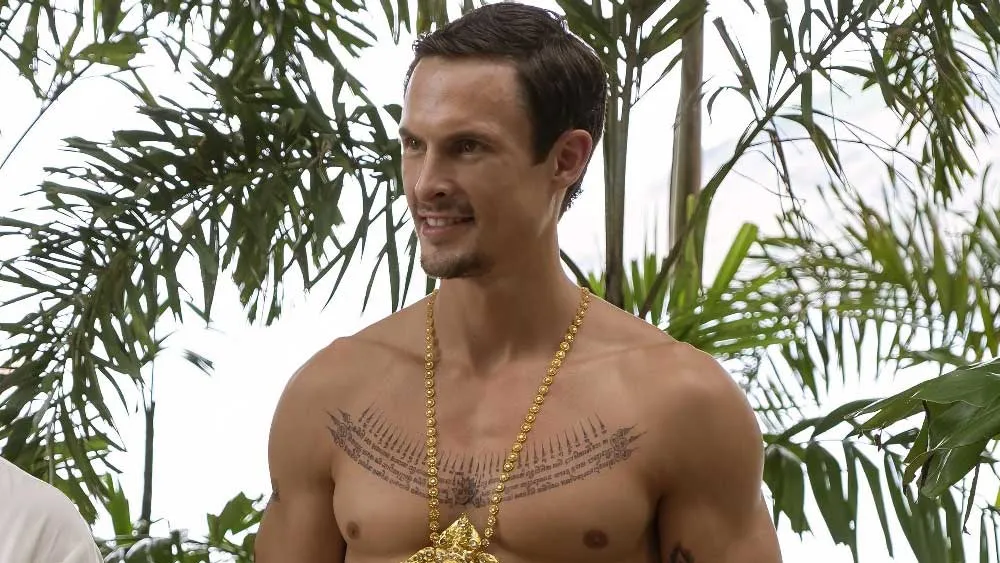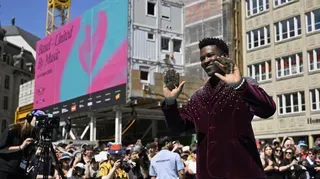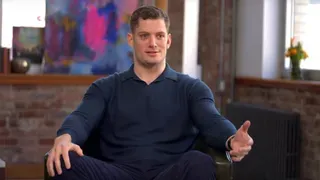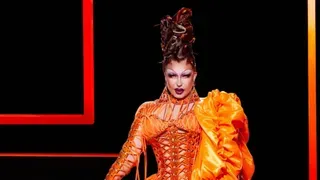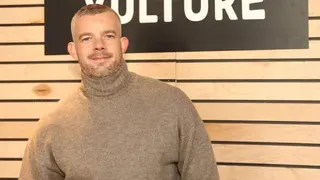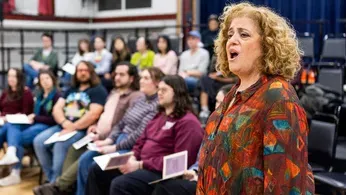
Mar 31
Broadway Vet Mary Testa Loves New Talent, and Finds it in 'Night Side Songs'
Nicholas Dussault READ TIME: 10 MIN.
The American Repertory Theater's latest production, "Night Side Songs," is an intimate, communal music-theater experience uniting the audience in a journey through illness that, according to the A.R.T.'s Artistic Director Diane Paulus, "holds the power to heal." Set in both The Cambridge Masonic Temple in Cambridge and Hibernian Hall in Roxbury, the performance encourages the audience to experience their own catharsis through the power of communal song and shared space.
Written by Richard Rodgers Award recipients – and brothers – Daniel and Patrick Lazour, whose previous musical "We Live in Cairo" premiered at the American Repertory Theater in 2019, the musical premiered in New York City off-Broadway at the New York Theatre Workshop in 2024. "Night Side Songs" was inspired by Susan Sontag's observation that "illness is the night side of life." Their folk-inspired score and stories of illness and death over many years promise an inspiring journey that will likely bring you to tears.
Watch Mary Testa sing the Kurt Weill/Maxwell Anderson classic "Lost in the Stars"
The extremely talented ensemble (including many Broadway vets) features Broadway legend Mary Testa, a three-time Tony nominee whose career spans nearly 50 years. She came to New York in 1976 on the behest of William Finn, and appeared in his first Marvin musical, "In Trousers" off-Broadway in 1979. She continued her relationship with the composer/lyricist with that musical's sequel, "March of the Falsettos" (1981) and "A New Brain"(1998) at Lincoln Center Theater. Always one to embrace new talent, she has had a strong working relationship with Michael John LaChiusa, appearing in his musicals "Marie Christine" (1999), "See What I Wanna See" (2006), "First Lady Suite" (2004 revival), and "Queen of the Mist" (2011), the latter two with the Transport Group. For her Broadway debut in "Barnum" in 1980, she said, "I had to wear leotards and a tutu. Not my best look." She went on to appear in the ill-fated "Marilyn: An American Fable" (1983); "The Rink," (1984) as a stand-by for Liza Minnelli, for whom she subbed for the last month of its run; and the 1986 revival of "A Funny Thing Happened on the Way to the Forum." She received the first of her three Tony Award nominations for three revivals: "On the Town" (1998), "42nd Street" (2001), and Daniel Fish's revelatory take on "Oklahoma!" (2019), where she played Aunt Eller. She has also appeared as Matron "Momma" Morton in "Chicago" (2005) and Madame Morrible in "Wicked" (2014). She also appeared in the camp classic "Xanadu" in 2007.
Never one to shy from embracing new work and talent such as the work of the Lazour brothers, EDGE recently EDGE chatted with Ms. Testa as she prepared for "Night Side Songs."
Watch the trailer to "Night Side Songs"
EDGE: How would you describe "Night Side Songs"?
Mary Testa: It's a show about sickness – specifically, the lead character [has] cancer. But it's really about caregiving, and the community that happens with that. It's about something bigger than just the journey of the one person who is highlighted. It's an incredible show. I had done a reading of it several years ago, then wasn't available for subsequent readings. Last summer the boys (Daniel and Patrtick Lazour) emailed and asked me to do a one-week workshop in Philly. That's how I got on board with this show, and I'm so incredibly moved by it. There's never been a show like this. It's engineered so that the audience sings along. They get a pamphlet with lyrics, and there's one character who teaches them the songs. Not all of the songs are singalong. What happens is, people are either uncomfortable or just don't want to sing. You can see their trepidation. But then they do, and it becomes an incredibly emotional, moving experience, because every single person in life has had some loss or someone who was ill. It becomes this incredibly moving community experience.
EDGE: When you first saw the script, did you at all think, "Oh no it has an audience singalong"?
Mary Testa: No. I trusted the material. I'm a very big proponent of new things. I've done my fair share of revivals, but my heart is really in supporting new work, new young voices. I think these boys are extraordinary, and I think they're going to make their mark in a big-time way. So, I was drawn to the music, as I always am, and the subject of the show. I've been doing this now for 49 years, and my thing is I'm going to go with what makes my heart happy, and working with new writers and new material that has substance makes my heart happy.
EDGE: It's not a traditional theater setting. Do you find that challenging?
Mary Testa: It's kind of circular. I find it really interesting, because you really get a sense of people. We did [the show] for a week at the Under the Radar Festival, and you could see people in the audience. Some people would lose it, really lose it. Talking to them afterwards, you'd learn they had just lost someone, they're a caregiver, or they just care. There's a guy I know who came to the show. He was sitting in the front row and was a mess. He said, "I lost my mother eight years ago, and I was her caregiver." This really just whacked me, watching people be so affected. I don't remember seeing anybody bored. People can get bored. I did "Oklahoma!" (the Daniel Fish's 2019 revival) on Broadway, and we were very close to people. It's sometimes challenging, because audiences don't know how to behave anymore. But in this instance, it was really very moving to see. It can be hard, because it's such a deep, moving show.
EDGE: Do you find yourself experiencing your own version of what the audience experiences?
Mary Testa: Absolutely, over and over again, in different ways at different times. And it's always music – the primal thing about music that kind of hits you in the gut. The music will send me, very often, over the edge. And if I look and see somebody that's weeping, I will go. It's challenging keeping it together.
EDGE: Tell me a little about the story.
Mary Testa: It's 10 or 11 scenes, and they do these visions where they bring you to different times and places and talk about the same thing and what happened to the person in that time. They go back to the modern founder of chemotherapy in the '60s. I play a character, Prudence, who is in the 1500s and has developed a breast thing, and goes to a priest to try to cure it. It's also the story of this woman, Yasmine, her journey of illness and the people around her.
EDGE: Do these scenes ever intertwine?
Mary Testa: No, not really, but what happens is that you get a sense of how things happened at that time, and that the emotion is the same for people no matter what the timeframe is. Illness is illness, death is death, and grief is grief. It's really interesting.
EDGE: How would you describe the music?
Mary Testa: It's beautiful, sort of poppy, rocky kind of music. It lives around there, but there's also medieval sort of sounds. These boys are very original. I call them boys because they're young. They're in their 20s and 30s, so they're boys, and they're just adorable and deeply talented. It's a little bit of everything. It's not your classical musical theater, which is fine with me. They're both brilliant writers, and they sort of break the mold of classical musical theater writing.
EDGE: Let's shift gears here. You've been working as a professional actor for almost 50 years. That's incredible.
Mary Testa: I moved to New York in 1976. A lot of people have been at this for that long. This is what I love. I've gotten to a certain age where I'm able to pick and choose what I work on. I've been busier than ever, and I'm very happy.
EDGE: Is there anything you haven't done that you'd like to do?
Mary Testa: No, not really. I suppose there's a couple of shows I would love to do, but, I like I said, I really love new work. Something new is always very appealing to me. I'm constantly doing readings and all kinds of things. I enjoy all of that, and, like I said, I'm at a stage of the game where I can choose what I want. If something appeals to me, I can do it. If it doesn't appeal to me, I can say no. It's lovely.
EDGE: What was it like at the very beginning for you?
Mary Testa: I went to the University of Rhode Island and I majored in theater. I didn't finish because I had finished all my theater credits after my first semester junior year, so I quit and worked three jobs to save up enough money to come here (New York). When I moved here I started working instantly with Bill Finn, because I had met Bill when I was in college. That's how my doing one of his first shows, "In Trousers," came about.
I had to work as a waitress for the first three years I was here. I did a cashier job and a waiter job, and then I got this job where I was a union waiter in this really sort of upscale place. I got a six-week Stuart Ostrow grant-thing, and it was a new musical revue every week. It was almost like "Saturday Night Live," but for musical theater. It was a company of actors, a couple of directors, a company of writers, that whole thing. I went to the managers of my restaurant, who hated me, and I said, "Can I take leave?" It was a union job, so it was a really good job and benefits. They said, "No, you can't." I went to my waiter friends, and they said, "Did you move here to be a waiter or an actor?" I knew they were right. I quit, and have never had to do another job after that.
EDGE: What would you say to somebody who just got off the proverbial bus at Port Authority?
Mary Testa: I'd say do as many things as you can. Say yes to everything when you're young, say yes to everything. Get every experience you can possibly get. If you need to study, study. If you need to take voice lessons, take voice lessons. Do as many things you can do until you find out what you're really all about. It takes a long time to really know who you are. Of course, if you've got to pay bills, get a job, and then just work around it.
EDGE: Do you recommend they shoot for the stars?
Mary Testa: I don't know. Some people like that, but that's not for me. Some people shoot for the stars. I say dream as big as you want to dream.
EDGE: You seem perfectly happy.
Mary Testa: I'm perfectly fine. I'm completely happy.
EDGE: Would you do anything differently if you could do it again?
Mary Testa: I don't think so. I don't really have any regrets. I believe I take care of myself in a great way, and I take care of my work in a great way. My answer is no, I wouldn't do anything differently.
"Night Side Songs" runs through April 6 at The Cambridge Masonic Temple (1950 Massachusetts Ave., Cambridge. And from April 9 through April 20 at the Hibernian Hall, 184 Dudley St., Roxbury, MA. For further information, the American Repertory Theater website.
Jordan Dobson performs "Santa Cruz" from "Night Side Songs."
